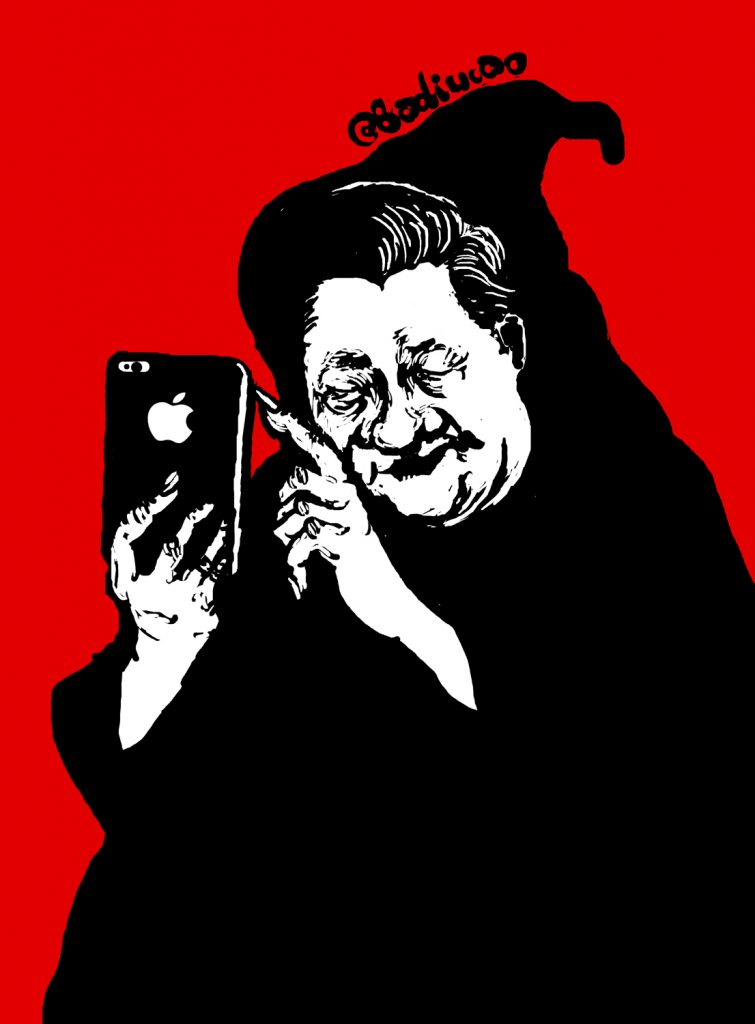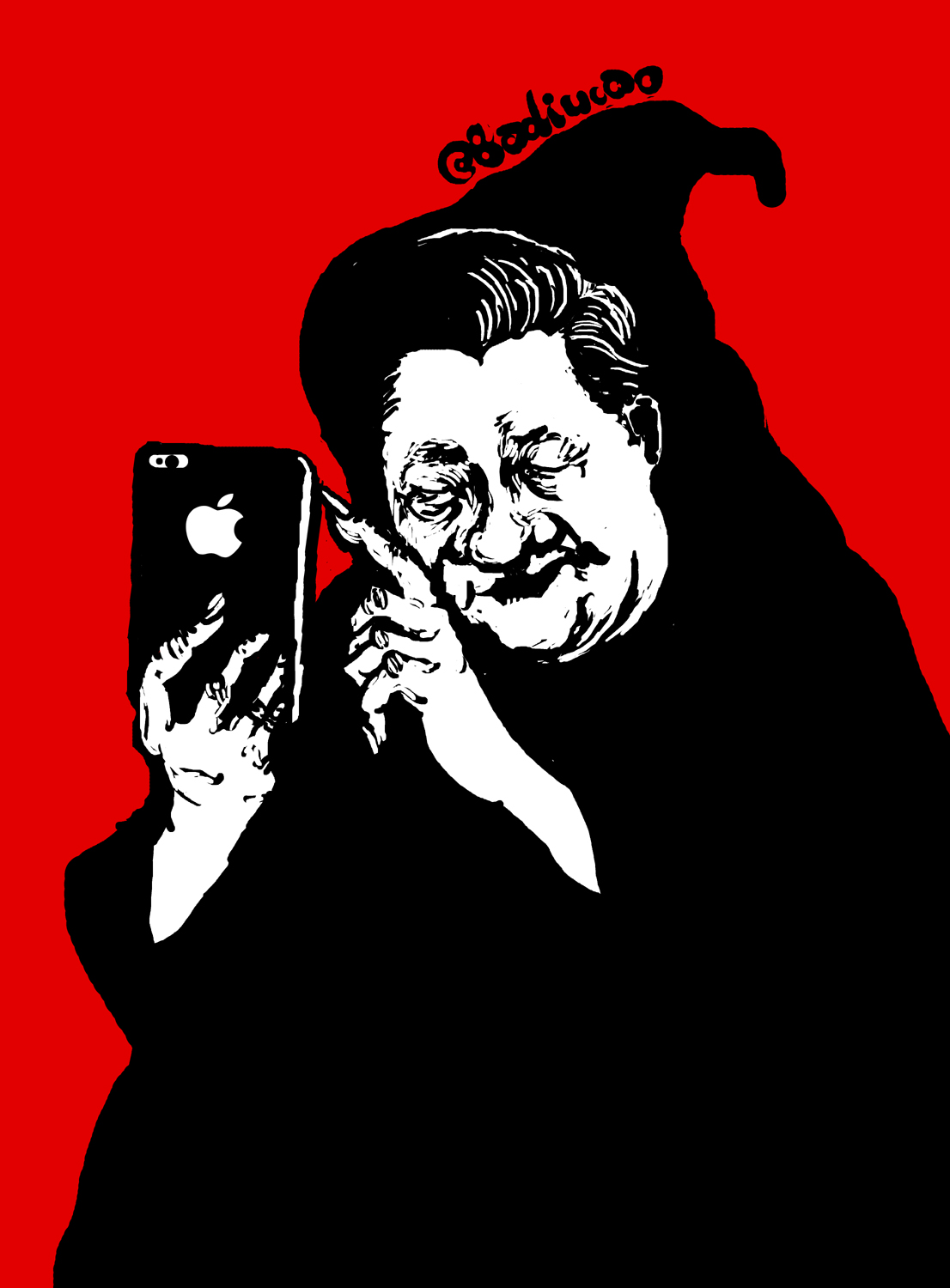China has been tightening up internet controls by targeting individuals’ VPN access and expanding its crackdown on the use of foreign social media apps. Meanwhile, Apple recently announced plans to open its first data-storage facility in China to comply with regulations in Beijing’s new Cybersecurity Law. CDT resident cartoonist Badiucao offers the following illustrated commentary:

“The Poisoned Apple,” by Badiucao for CDT.
Badiucao’s cartoon portrays Xi Jinping in the likeness of the Disney’s Wicked Queen—rather than offering the poisoned apple that “let the Sleeping Death seep through” Snow White, Wicked Xi offers his constituents a poisoned iPhone with which to better monitor them. Reporting for The New York Times earlier this month on Apple’s upcoming Chinese data center, Paul Mozur, Daisuke Wakabayashi, and Nick Wingfield outlined the regulations the company is attempting to meet, and also highlighted the symbol that the iPhone has become in China:
[Despite being a symbol of middle-class ambition in China…] the iPhone has also become emblematic of China’s long reliance on foreign technology. Even before China passed the cybersecurity law last year requiring that the online data of its citizen be stored domestically, the country was pressuring foreign technology companies to operate its computer servers within its borders.
Apple already stores some of the data of China’s residents in local servers, but the new agreement goes one step further with a Chinese partner responsible for running its data center, managing the sales of its services in the country and handling legal requests for data from the government.
[…] Foreign companies like Apple have had to adapt in other ways to stronger Chinese government scrutiny, often by helping to expand Chinese technological capabilities. For instance, Apple said this year that it would establish two research and development centers in China. Last year, it invested $1 billion in Didi Chuxing, a Chinese ride-hailing service. Apple has been far more profitable in China than most of its Western peers, but that success has led to pushback from the government. More than a year ago, Apple’s iBooks Store and iTunes Movies were shut down in China, six months after they were introduced there.
[…] Even though other American technology giants such as Facebook and Google are blocked in China, Apple has maintained a thriving business in the country by adhering to local rules. It also helps that Apple’s smartphones and computers do not carry the same political or security risks as social media platforms and networking equipment. [Source]
Foreign social media and technology firms have long found it difficult to reach the Chinese market. Facebook and Twitter have been banned since 2009 after being blamed for fomenting unrest in Xinjiang, and last week Beijing partially blocked Facebook-owned WhatsApp. In 2014, LinkedIn launched a Simplified Chinese version after catering to Beijing’s censorship demands, that has so far fallen far short of its desires user base in the country and last week saw its first president resign. A more recent report from The New York Times’ Paul Mozur and Carolyn Zhang describes the hurdles that foreign tech firms face in China—based both on authorities’ desire to give domestic companies an advantage and to “maintain social stability“—focusing in on how Apple has adapted to the challenges:
This summer of challenge for the three companies [Facebook, Microsoft (who owns LinkedIn), and Apple] offers a broad illustration of just how varied the obstacles have become for foreign companies in China. They also show in stark terms why this vast market has been frustratingly difficult for outsiders.
[…] There are issues beyond offending censors. The Chinese internet culture is different, and at times quirky. And the technical requirements of China’s internet filters can make operating difficult. Engineers often have to find alternatives to the services technology companies rely on outside China.
[…] Yet keeping Beijing satisfied is only part of the challenge for Apple. With more and more Chinese smartphone makers selling high-quality smartphones cheaply, the company’s sales in the country have slid over the past two years. In the second quarter ending April 1, the company’s revenue in greater China fell 14 percent, even as the market remains critical. Greater China accounts for 21 percent of the company’s sales, making it Apple’s most important market after the United States.
In a new tack for Apple in China, just last week it created a new position, general manager for greater China, and appointed a longtime manager, Isabel Ge Mahe, to the position. Ms. Ge Mahe was born in China, speaks Mandarin and has deep engineering experience. The company is also in search of a greater China policy head after its former head, Jun Ge, recently resigned, according to two people familiar with the matter. […] [Source]
Following the recent VPN crackdown and the resurgence of censors’ distaste for the animated bear Winnie the Pooh, Bloomberg News’ Christina Larson and Steven Yang provide a broad look at Xi’s efforts to expand Chinese “internet management” practices by reinforcing control over what Chinese web-users can access:
This isn’t a temporary tightening, but rather the new reality of President Xi Jinping’s internet. China’s censors have shown they can erase political criticism and dissent, and are now growing more ambitious, aiming to shape the world online to reinforce Communist Party values and morals. While embracing the efficiency and growth of the internet, what Chinese authorities want is an altered and nonthreatening version.
“It’s a decidedly Orwellian moment for China,’’ says Jeff Wasserstrom, a Chancellor’s Professor of Chinese History at the University of California at Irvine.
While Xi’s predecessors – Hu Jintao, Jiang Zemin, and Deng Xiaoping – focused on gaining public support by making people’s lives materially better, his government has put a more pronounced emphasis on winning hearts and minds. That’s evident in how often he’s personally mentioned in state media reports, prompting some observers to question if Xi favors the ideological, personality-driven leadership style of Mao Zedong over the pragmatic, collective approach of Deng.
Unlike Mao however, Xi has the internet to contend with. […] [Source]








